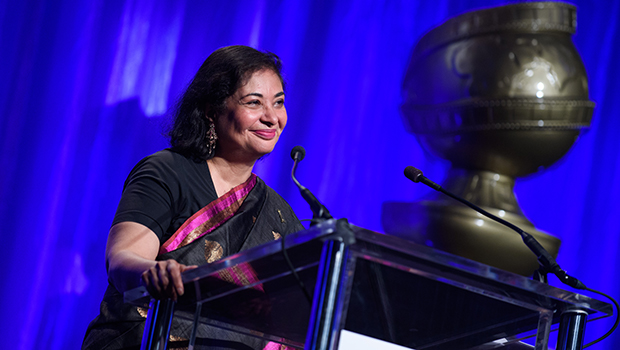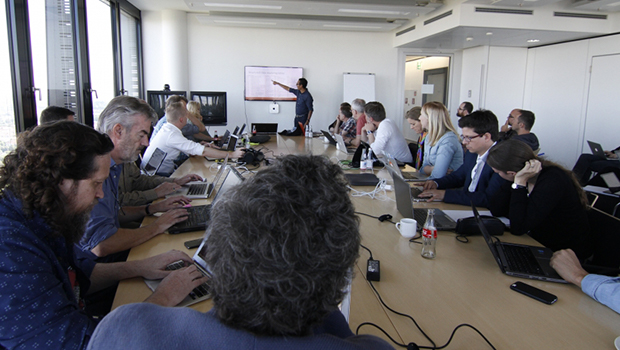At the 75th Golden Globes Award ceremony, the Hollywood Foreign Press Association announce it would donate $1 million to the International Consortium of Investigative Journalists and the Committee to Protect Journalists. ICIJ relies on big donations like this, as well as smaller individual donations, to support our investigative journalism.
In our Meet The Funders series, we speak with major donors about why they choose to support us. Today, we speak with Hollywood Foreign Press Association president, Meher Tatna.
Can you tell us a little about the Hollywood Foreign Press Association and its role? And the HFPA’s connection to the Golden Globes?
The Hollywood Foreign Press Association is a trade organization of journalists that was founded in the 1940’s during World War II. The journalist members cover the entertainment industry for international outlets across the globe. At present, we have 90 active members representing 56 countries with a combined readership of 250 million.
The HFPA is also producer of the Golden Globe Awards. We celebrated the 75th anniversary of the show in January 2018. Every active member votes for the nominees and winners of the Globes.
I think if investigative journalism is at least supported by Hollywood’s money, we are doing something valuable.
The mission of the HFPA’s Charitable Trust is to foster education, diversity and creative expression in art and film through a variety of programs and special grants. For more than 25 years, the HFPA has been able to use the funds garnered through Golden Globe licensing fees to donate over $30 million in grants, provide more than 1,500 scholarships for underrepresented student filmmakers and storytellers in the arts and help preserve Hollywood’s legacy through the restoration of over 90 films. In addition, the HFPA has donated millions in humanitarian grants over the years to organizations including the International Rescue Committee and FilmAid.
How did you get your start as a journalist? Can you tell us a little about your experience as a journalist in India and the United States?
I did not work as a journalist in India. I was always passionate about the arts but received a scholarship to study economics at Brandeis University in Waltham, Massachusetts. Upon graduation, I moved to New York City and, soon after, enrolled in drama school. A decade later, I moved to Los Angeles to continue an acting career but fell into entertainment journalism.
What motivated HFPA this year to donate $1 million each to International Consortium of Investigative Journalists and to the Committee to Protect Journalists?
The seed was planted by Meryl Streep in her rousing speech at the Globes two years ago. Our support for our fellow journalists is also a reflection of the times we live in, where more than ever, an informed citizenry can only exist with a press that is free and fearless to tell truth to power.
Why did you feel it was important to make an announcement to support journalism during the 75th Golden Globes announcement? Is this something the HFPA plans to continue doing?
While the Golden Globes show is a household brand, the HFPA is not as well known outside of the entertainment industry. It is my goal to broaden the awareness of our work, specifically in the philanthropic space, and I felt that using the global platform of the show was the right opportunity to educate millions of viewers about who we are, what we do and to spotlight two noteworthy organizations with our grants.
Can you tell us a little about how you first heard of ICIJ? (Which project did you hear about first or perhaps you remember the story that we were part of?)
I remember following the newspaper accounts of the offshore money laundering entities several years ago when the Panama Papers stories were published. It was particularly shocking that so many heads of state and former leaders were implicated – I particularly remember that Margaret Thatcher’s family and Kofi Annan’s family were mentioned. I remember the Icelandic Prime Minister’s resignation – the only politician who was forced out. There were also stories in the Indian newspapers about Bollywood actors who were hiding their income. Then came the Paradise Papers, and there were even more politicians, celebrities and corporations that were named.
What role does Hollywood – or the entertainment industry – have in helping the public understand/realize the importance of journalism in holding the powerful to account?
I’m not sure that Hollywood can be a game-changer in forming people’s opinions. Yes, there have been important movies like “All the President’s Men“, “Spotlight“, “The Post“, “Goodnight and Good Luck“, “Broadcast News”, “The Insider”, to name a few. But I think if investigative journalism is at least supported by Hollywood’s money, we are doing something valuable.
Can you tell us a little about who else the HFPA has donated money to over the years?
The HFPA provides grants to nonprofit organizations year-round. The most recent of our grantees include Veterans in Film and TV, the Moth Radio Hour, the International Rescue Commission, Santa Monica College, the Los Angeles LGBT Center, and the Zimmer Children’s Museum. We continue to support USC, UCLA, American Cinematheque, the Ghetto Film School, Inner City Filmmakers, Film Noir, The Film Foundation, CSUN, LACC, the Los Angeles Conservancy – 61 grantees to date.
Given you grew up in India, can you tell us a little about what the media is like there compared with the United States? Do you think there is something each can learn from the other?
I read somewhere that India is the second largest market for newspapers in the world. There are more than 82,000 in publication, mostly in the vernacular. The Times of India is the only English-language paper in the top 10.
How do you hope the role of investigative journalism grows over the next five years?
It’s critical to encourage young people to study to be investigative journalists, with the rigorous legwork, fact-checking and integrity that involves. The all-pervasive and careless opinion reports on the web that pass as news are appalling. As journalists all over the world are targeted and harassed, locked up and tortured, all investigative journalists need to be energetically supported, as their work will only expand in the coming years.
We like to ask our network of journalists for tips and advice for upcoming, younger journalists. What would be your advice?
Only write what you can defend. Even honest mistakes in this climate can set back the cause of journalism disproportionately.



